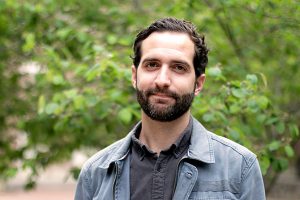One year into the pandemic, scholarship has changed significantly. Navigating the complications and limitations of researching and writing during the pandemic has presented a variety of challenges to the undergraduates, graduates, and faculty of the Department of English and Comparative Literature.
In order to collectively reflect on scholarship during this pandemic, we are reaching out to hear how members of the department have experienced these limitations and hardships. You can read about the experiences of undergraduates writing their theses here. Be on the lookout as well for updates on how faculty have approached their pedagogy during this time. You can also read two features on classes that have found success during the pandemic, Prof. Florence Dore’s songwriting course and Profs. Gaby Calvocoressi and Courtney Rivard’s poetics of gaming courses.
For this article, we spoke with PhD candidate Sean DiLeonardi about what his experience researching and writing through the pandemic has looked like. Our email interview with his experience is below:
What is your current research?
Sean DiLeonardi: I am putting the finishing touches on a dissertation that examines a formal preoccupation with quantifying the unquantifiable, a phenomenon that I argue underwrites the co-emergence of postwar realism and digital media. This project is part of my larger investment in tracing literary production to histories of science, technology, and media.
How has the pandemic changed your research habits?
SD: Overall, I am grateful to have been spared from the more serious effects of a pandemic that has disproportionately affected the most vulnerable communities, often along gendered and racialized lines. For me, as with most others, it has still upended the elements of daily life. While I have always shared caretaking duties with my spouse, the loss of an office space on campus, as well as the other library or coffee house nooks where I used to work, has meant that we have had to expend extra energy schooling and caring for our two kids, while somehow allowing the other to quietly complete their work. Spoiler alert: it never works out.
Relatedly, the loss of access to a physical library has meant that I am reading digital copies of original sources. Besides finding myself on my computer even more frequently than before (just ask my carpal tunnel), I also feel that this has had a negative effect on my thinking process, as I prefer to flip back and forth between marked passages, annotate in the margins, and in general enjoy the thinking that happens away from the computer screen.
And how has the pandemic changed your writing habits?
SD: In the fall semester, I found the emergency switch to remote education to be incredibly demanding of my time. Like many of my peers, the burden of building and maintaining a course site, recording and editing video lectures, and other new duties on top of our usual workload forced me to make regrettable compromises with my writing schedule. Because I am on the job market, it was enough extra labor to spend my evenings completing job applications. There was rarely much dissertation writing done beyond that. I am fortunate to be on a dissertation completion fellowship this semester, which has enabled me to return to a daily writing schedule.
Where do you see your research going from here?
SD: The most significant question that the pandemic has surfaced regarding the future of my research is whether or not it has a future. The pandemic appears to have severed the final thread on which the academic job market had been dangling. While I remain hopeful, it has yet to be seen if there will be a place for my research in what remains.
Has the pandemic led to any surprising positive outcomes for your work?
SD: Identifying a silver lining in all this has been difficult. Truthfully, the pandemic has forced me into a place of acceptance that is actually better not only for my research, but also for my mental health and the stability of my family. Prior to Covid-19, I met the normal pressures of academia and its diminishing options for viable employment with an unhealthy belief that success would find me if I worked hard enough, published often enough, and remained dedicated to the profession. The pandemic has not only obliterated the tenure-track options in my field; it has helped me do away with this personal commitment to a profession that was not committed to me in return. I still believe in my research and the contributions I have made to my discipline; but moving forward, I am more willing and open to consider options beyond the traditional tenure-track line to establish an outlet for my research. For example, this summer I will serve as Junior Fellow at the Library of Congress, where I will have the opportunity to curate a collection called “Arithmetic, Numeracy, Imagination.” I strangely owe this fabulous opportunity to the fact that the fellowship will be available remotely, due to the pandemic, but also to the fact that I have learned to think creatively about places where my skills and expertise will be appreciated. The summer fellowship may even be the start of an alternate path for me and my research, one that I was unable to imagine before.


